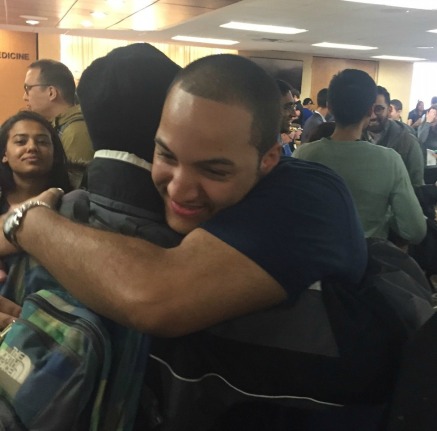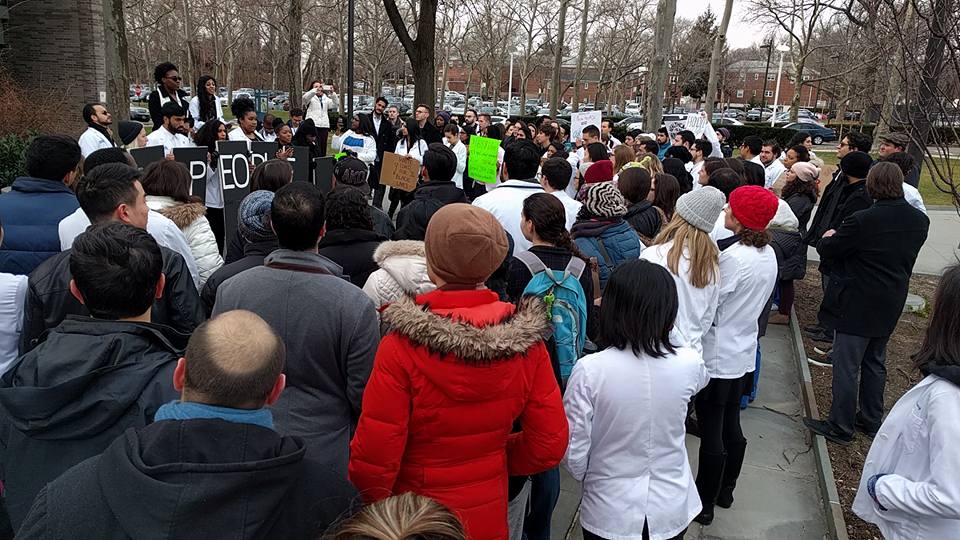Editors’ Note: Today is Match Day, when graduating medical students across the nation learn where they will spend their residencies. In this post, we hear from Travis Howlette, a student who shares his thoughts about how he felt leading up to when he found out about his matching at Mount Sinai.

Travis Howlette after learning of his match at Mount Sinai
If someone were to ask me the most important thing medical school has taught me, I would say “resilience.” My roller-coaster ride of training at Einstein has been nothing short of fun, challenging and filled with big and little accomplishments. During the “match” process, I cannot help but reflect on the moments that have led to this life-changing event. The past four years have blown by so fast that sometimes it is hard to imagine that I am graduating in May. When I think about getting from first year to now—moment by moment and step by step (literally and figuratively)—that’s when I feel the full weight of the four years I spent at Einstein.
Community Organizing
Classmates have always known me as someone who is very involved within our academic and social community. What many do not know is that community organizing and development were actually where I started my journey in medicine while at college in Boston. My interest was “birthed” from within that community by working on local health disparities with other community organizers and leaders in coalitions and advocacy groups in the Roxbury, Dorchester, Jamaica Plain, and Mission Hill neighborhoods. These same groups were the ones that pointed me toward resources for shadowing opportunities, mentorship connections and programming for students pursuing medicine that helped solidify the idea that I had what it takes to become the first doctor in my family.
Despite leaving that community to pursue continued education and personal growth, I still feel a sense of debt because I was indoctrinated with the belief that “from those to whom much is given, much will be required.” No matter how many accomplishments I may achieve, I will not feel the full joy of those accomplishments unless I know I have put in the work necessary to give others the opportunities that I received.
Finding My Niche
Einstein was not protected from the turbulent societal issues of racial injustice, gender inequality and those produced by a highly charged presidential race. I was elected representative from the class of 2017 in my first year of medical school. Most of us saw that role as providing support to my classmates and also welcoming the incoming first-years by leading orientation. This was a valuable way to bring my community-organizing expertise to campus, promoting acceptance, wellness and overall collegiality. But once again, the saying “from those to whom much is given, much will be required” entered the picture as an increasing number of societal issues were becoming of great interest to me and to others on campus.
My first taste of this new role occurred during my second year after I saw videos of the incidents involving Eric Garner and Michael Brown, unarmed African American men who were killed at the hands of police. Students of all races and ethnicities felt the uproar and hurt surrounding these events and, at times, felt “paralyzed” in their studies and day-to-day activities. I remember getting a text in the late hours of the night from an Asian American student and friend so distraught over what was happening that she needed to vent to someone willing to listen. We talked and consoled each other over what was happening in a makeshift therapy session. It was this moment that made me realize that my go-to stress relievers of Netflix, hanging out with friends and venturing to the city were not serving others who, like me, need to feel supported by their peers.
A deafening silence on campus was also causing more harm than good. However, through a series of meetings, events, town halls, retreats and various demonstrations, a group of very passionate classmates and I—together with the office of diversity enhancement, the office of student affairs and the office of academic support and counseling—were able to establish a structure for showing solidarity for issues that we (the students) and our local Bronx community feel strongly about.
 This culminated in one of the best-organized and most well planned efforts from students, Einstein’s administration and faculty and Montefiore’s administration to show support for the #DoNoHarm campaign—which rejected the repeal of the Affordable Care Act. It was extremely rewarding not only to see this effort come to fruition, with more than 60 students marching on campus accompanied by local news outlets, but also to witness that a community at Einstein I helped foster was in good hands, with leadership coming from all classes, not just the fourth-years.
This culminated in one of the best-organized and most well planned efforts from students, Einstein’s administration and faculty and Montefiore’s administration to show support for the #DoNoHarm campaign—which rejected the repeal of the Affordable Care Act. It was extremely rewarding not only to see this effort come to fruition, with more than 60 students marching on campus accompanied by local news outlets, but also to witness that a community at Einstein I helped foster was in good hands, with leadership coming from all classes, not just the fourth-years.
Thoughts on the Next Community
As I look down the road to the Mount Sinai community where I will be welcomed as a resident, I cannot help but look back at Einstein and feel a sense of sadness that this is all coming to an end. My four years at the College of Medicine have contributed enormously to my growth as a person and healthcare leader. When I think back to my first-year orientation, I recall that the administration touted Einstein’s core competencies. I remember thinking that it all sounded like a series of nice-sounding words that in practice were not realistic. Four years later, I have learned that I can walk away from Einstein saying that I proudly embody those competencies—as a healer, scientist, advocate, educator, colleague, role model and lifelong learner—and look forward to putting them to good use as I serve others.
Thank you to the Einstein community, which has given me so much! I look forward to continuing to be part of that community going forward.

